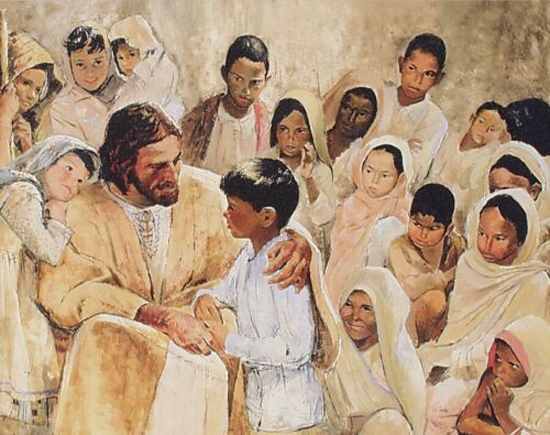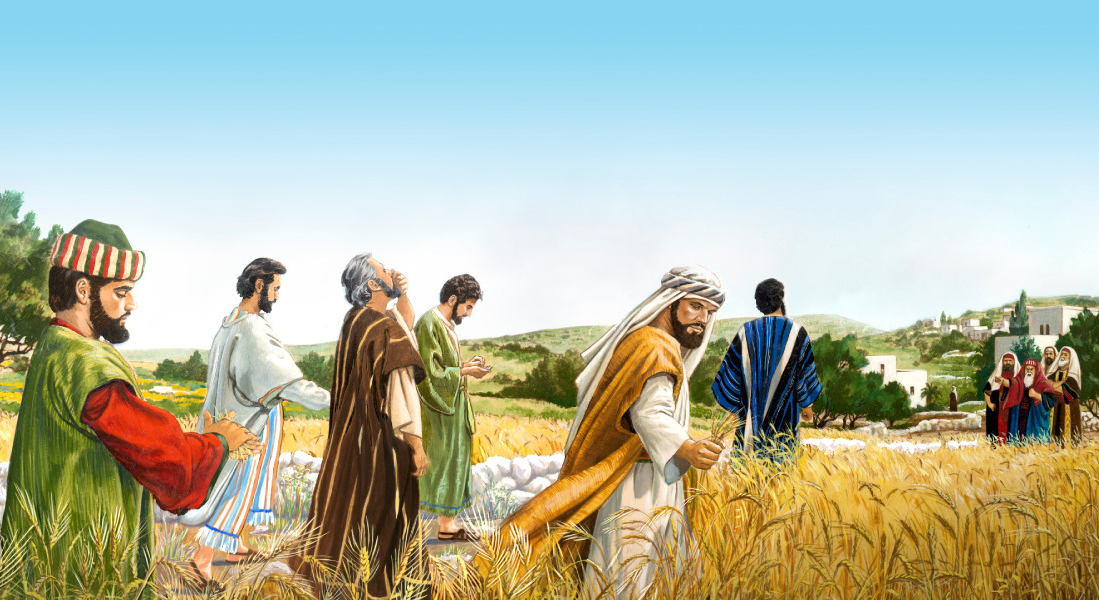Christian Art | Jesus And A Child | Meditations On The Love Of Jesus Christ
Luke 9: 46-50 – Week 26 Ordinary Time, Monday (King James Audio Bible KJV, Spoken Word)
46 ¶ Then there arose a reasoning among them, which of them should be greatest.
47 And Jesus, perceiving the thought of their heart, took a child, and set him by him,
48 And said unto them, Whosoever shall receive this child in my name receiveth me: and whosoever shall receive me receiveth him that sent me: for he that is least among you all, the same shall be great.
49 ¶ And John answered and said, Master, we saw one casting out devils in thy name; and we forbad him, because he followeth not with us.
50 And Jesus said unto him, Forbid him not: for he that is not against us is for us.
Today’s Gospel verses follow upon Jesus’ second announcement of his Passion, which the disciples do not understand and about which they are afraid to ask Jesus. This lack of understanding and fear, a certain kind of removal from Jesus, lead into an argument among the disciples about which of them was the greatest. We may sense in these verses some jockeying for position as the disciples think of themselves apart from Jesus, as, perhaps, that which is veiled is nonetheless dimly communicated, and as the hearts of the disciples are as yet far from perfect understanding of Jesus.
In Luke’s Gospel, it is without being told the disciples’ question that Jesus knows the troubled thought of their hearts. Jesus responds to the disciples’ dispute with an answer to their question. By way of answer, Jesus takes the child and shows him to the disciples. Then Jesus teaches the disciples the lesson.
The lesson of the child is complex and carries a variety of meanings in the Gospels. We are taught by Jesus that we must become as little children if we are to enter the Kingdom of heaven. We are asked to consider what this means: to become as a child. One part of this teaching is that we must trust and have faith in God our Father. We are also called not to be so self-reliant, but rather reliant on God. We grow in humility and fellowship through our agreeing to be more like a child.
Now we are asked by Jesus to think of the poverty represented by children. The child is reliant on the will of the family which has brought him or her into being. Beyond the immediate family, a whole social structure is entailed. The child has only what others can and wish to give to him or her. We are asked by Jesus to give to this child, who is in a position of such dependency.
We are asked by Jesus to be as a child. We are asked to receive ‘this child’. We may understand this as receiving all children, and also as receiving, being kind to, all the little ones of the world, those who have no power. There is also a sense of specificity: the child is ‘this’ child, not an abstraction but a particular individual, a person. We are asked by Jesus to receive and to be kind to every individual human being as if we are receiving and being kind to Jesus, which in fact is what we then will be doing. We are taught by Jesus to see Jesus in everyone – in every individual one.
There is to be no exclusivity so long as we are with Jesus. Don’t tell other Christians not to do what they can to ask people to be with Jesus. We all have a role to play in this regard. The last thing we should want is division among Christians. All our efforts should be toward Christ.
This truth also can at times demand humility. In this teaching also we are each to become as a little child, and looking to see Jesus in everyone.
Concluding Prayer | Love Revealed By Jesus Christ
Almighty Lord and God,
protect us by your power throughout the course of this day,
even as you have enabled us to begin it:
do not let us turn aside to any sin,
but let our every thought, word and deed
aim at doing what is pleasing in your sight.
We make our prayer through our Lord.
![]()

King James Audio Bible | Endnotes
Jesus And A Child
In Luke 9:46-50, the disciples were arguing among themselves about who was the greatest among them. Jesus, being aware of their discussion, took a child and set him beside him, saying: ‘Whosoever shall receive this child in my name receiveth me: and whosoever shall receive me receiveth him that sent me: for he that is least among you all, the same shall be great.’ This incident illustrates the importance of humility and the need to care for the weak and vulnerable, as children were often seen as insignificant in ancient times. (Still to this day in Greek, children are not grammatically masculine or feminine; there are neuter.)
Throughout the Old Testament, we see the importance of children in God’s eyes. In Genesis 21:12, God promised Abraham that his descendants would be as numerous as the stars in the sky. In Psalm 127:3-5, children are described as a gift from God, and the fruit of the womb is a reward. Proverbs 22:6 exhorts parents to train up a child in the way he should go, and when he is old, he will not depart from it. In Isaiah 11:6-9, the prophet speaks of a time when a little child shall lead them, and the lion and the lamb will dwell together.
In the New Testament, Jesus Himself was born as a vulnerable child, and Jesus’ birth was announced by the angels to shepherds in the fields. In Matthew 18:2-6, Jesus tells his disciples that unless they become like little children, they cannot enter the kingdom of heaven. In Matthew 19:14, Jesus rebukes his disciples for trying to prevent children from coming to him, saying: ‘Suffer little children, and forbid them not, to come unto me: for of such is the kingdom of heaven.’
Over the centuries, theologians and religious authorities have commented on the significance of Jesus’ actions in Luke 9:46-50. Saint Augustine wrote: ‘The Lord sets a child in the midst, to signify that in humility is the foundation of the Christian life.’ Martin Luther said: ‘Let us learn to regard the children in our midst as Christ Himself, and treat them accordingly.’ Pope Francis has emphasized the importance of caring for the vulnerable and marginalized, including children, saying: ‘God entrusts us to care for those who are most vulnerable: the poor, the sick, the unborn, and the child.’
Jesus’ actions in setting a child in the midst of his disciples were a powerful illustration of the importance of humility, caring for the vulnerable, and recognizing the value of even the least among us. As we strive to follow Jesus’ example, may we remember the words of Jesus in Matthew 25:40: ‘Inasmuch as ye have done it unto one of the least of these my brethren, ye have done it unto me.’








